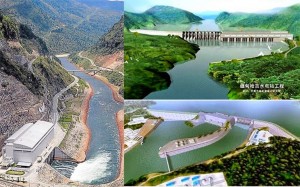The suspension of hydroelectric projects on Pawn and Salween rivers and other large-scale power projects in Karenni State has been called for by 17 Karenni civil society organizations (CSOs) in a statement released March 14, the International Day of Action for Rivers and Against Dams.The groups cited concerns about negative environmental impacts on Karenni people and threats to the ongoing peace process.

“Pawn River has been beneficial to us for many centuries and blocking it could cause big problems. This project is like a time bomb for the peace process. I am very worried that once the dam is constructed on the river, it will cause troubles for the residents of the ancient Bawlakhe City right beside the river. This could also break the ceasefire signed by the KNPP [Karenni National Progressive Party], so this project could threaten peace in Karenni State,” said Khu Ko Reh of the Karenni Civil Society Network.
CSO members also expressed concern that government troops would be sent in to provide security reinforcements around dam sites during construction, possibly threatening the accord between the army and several ethnic armed groups in Karenni State.
The proposed hydropower dam site in Pawn lies alongside historic Bawlakhe Township, home to an ethnic subgroup of Karenni people and an important Karenni heritage site that locals hope to preserve. The civil society statement also references conclusions made by seismologists who assert that dams on the Salween River would be at risk of earthquakes due to its location on a fault line.
The Chinese Datang Corporation signed a Memorandum of Understanding (MOU) with the Myanmar government in 2010 for the construction of three hydroelectric dams in Karenni State. The first would produce 600 megawatts of electricity in Ywathit on the banks of the Salween River (also called Thanlwin) that is about 14 kilometers from Bawlakhe Town. The second dam, on the Pawn River, would generate 130 megawatts of power, and the third, slated for construction on the Thatbet River, would produce 110 megawatts. According to the CSOs’ statement, the company has already begun land surveying for construction without yet holding consultations with residents.
The Salween, Pawn and Thatbet rivers are considered by many as the lifeblood of the Karenni people, who depend on the local ecosystem for forests, agriculture, and fishing.
The 17 CSOs urged the government to suspend hydropower and other major projects until ethnic groups achieve the right for self-determination within a federal system and political solutions are found for key ethnic issues.
The 17 Karenni CSOs that released the statement include the Karenni State Farmers Union, Karenni Women Association, Future Thanlwin, Kayah State Youth Network, Karenni National Youth Organization, and Karenni Teachers Union.
